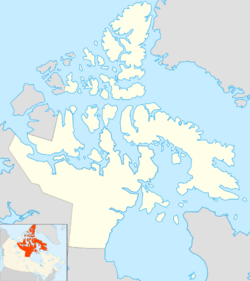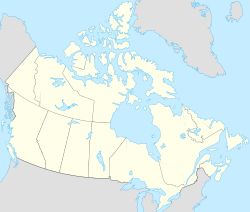Brook Island facts for kids
| Geography | |
|---|---|
| Location | Frobisher Bay |
| Coordinates | 63°18′00″N 067°51′36″W / 63.30000°N 67.86000°W |
| Archipelago | Canadian Arctic Archipelago |
| Administration | |
|
Canada
|
|
| Territory | Nunavut |
| Region | Qikiqtaaluk |
| Demographics | |
| Population | Uninhabited |
Brook Island is a small, uninhabited island located in the vast Canadian Arctic Archipelago. This means no people live there permanently. It is part of the Qikiqtaaluk Region in Nunavut, Canada's largest and northernmost territory.
The island sits in Frobisher Bay, a large inlet of the Atlantic Ocean. It is found southeast of Iqaluit, which is the capital city of Nunavut. Brook Island is considered an offshore island of Baffin Island, one of the largest islands in the world.
Other islands nearby include Brigus Island, Falk Island, Gay Island, Precipice Island, and Smith Island. These islands are also part of the amazing Arctic landscape.
Contents
Exploring Brook Island's Location
Brook Island is nestled within Frobisher Bay. This bay is a significant body of water in the Canadian Arctic. It connects to the Atlantic Ocean, making it an important part of the Arctic coastline.
Where is Frobisher Bay?
Frobisher Bay is located on the southeastern coast of Baffin Island. Baffin Island is the largest island in Canada. It is also the fifth-largest island in the world. The bay stretches inland for about 240 kilometers (150 miles).
The Canadian Arctic Archipelago
Brook Island is one of many islands in the Canadian Arctic Archipelago. This huge group of islands is in northern Canada. It includes thousands of islands. Many of these islands are uninhabited, just like Brook Island. They are known for their cold climate and unique wildlife.
Nunavut is a massive territory in northern Canada. It was created in 1999. Most of its population is Inuit, the Indigenous people of the Arctic. Nunavut covers a huge area. It includes much of the Canadian Arctic Archipelago.
Life in the Arctic Environment
Even though Brook Island is uninhabited, it is part of a vibrant ecosystem. The Arctic environment is very special. It has unique plants and animals. They have adapted to the cold climate.
Arctic Climate and Landscape
The Arctic experiences long, cold winters. Summers are short and cool. The landscape often features tundra. Tundra is a treeless plain. It has permafrost, which is permanently frozen ground. This makes it hard for large plants to grow.
Wildlife of the Arctic
Animals like polar bears, seals, and various seabirds live in the Arctic. They are well-suited to the cold. Many birds migrate to the Arctic in summer. They come to nest and raise their young. The waters around islands like Brook Island are important habitats. They provide food for marine animals.
Why Are Arctic Islands Uninhabited?
Many islands in the Canadian Arctic, including Brook Island, are uninhabited. There are several reasons for this.
Harsh Conditions
The Arctic climate is very challenging. Extreme cold and long periods of darkness make living difficult. Resources like fresh water and food can be scarce. Building and maintaining homes is also hard.
Remote Location
These islands are often very far from populated areas. Getting supplies and traveling to and from them is tough. There are no roads connecting them to cities. This makes them very isolated.
Protecting Nature
Some uninhabited islands are protected areas. They are important for wildlife. Keeping them uninhabited helps preserve their natural state. This allows animals to thrive without human disturbance.
 | Chris Smalls |
 | Fred Hampton |
 | Ralph Abernathy |



